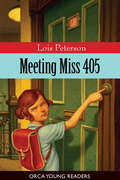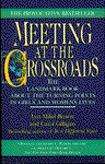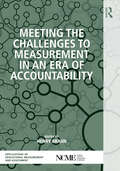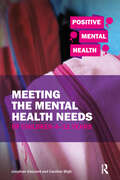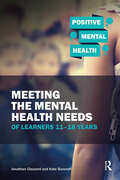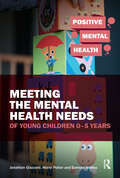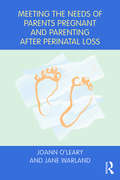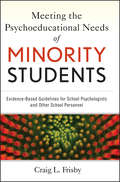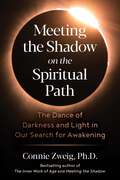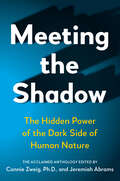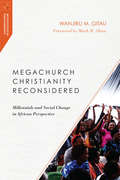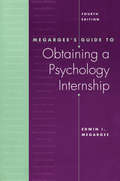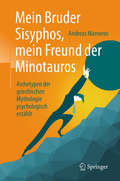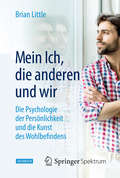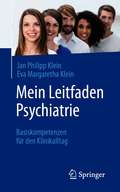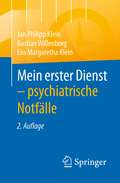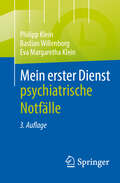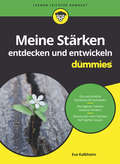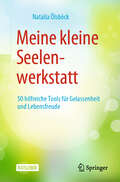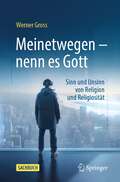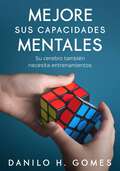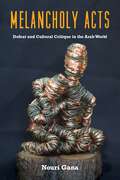- Table View
- List View
Meeting Miss 405 (Orca Young Readers)
by Lois PetersonLife is hard enough for Tansy with her depressed mom away indefinitely and her dad making a mess of things at home. But then Dad sends her down the hall to a wrinkly old babysitter named Miss Stella, who Tansy hates on sight. Miss Stella has a unique perspective on life, to say the least, but with the help of her best friend Parveen, Tansy gradually learns to manage all the changes in her life and make unexpected new friends in the process.
Meeting Your Half-Orange: An Utterly Upbeat Guide to Using Dating Optimism to Find Your Perfect Match
by Amy SpencerHow would you like to have a wonderfully well-suited, kind, adoring half-orange who feels like a teammate, a partner in crime, a true other half? "Half-Orange" refers to the Spanish term mi media naranja, which describes one's sweetheart, that perfect other half. What if you heard he or she would be coming along soon? Would you be relieved? Excited? Happy? Well those are the feelings that dating optimism can give you. Rather than admonishing readers to make themselves more available, or turn dating into a full-time job, Spencer's program of dating optimism is a fun, results-oriented way to find a healthy happy relationship, based on brain science and psychology that can help you become a more positive dater. She'll guide you through sowing the orange seed of your ideal relationship and growing it to "fruit-ion. " In essence, by focusing positively about dating, you can actually change your brain, which changes everything from your body language to the way you perceive others and what you ultimately attract. Meeting Your Half-Orange is the pep talk that puts finding true love back into your own hands. It will guide you toward becoming so focused on the relationship you want and so happy in your own skin, the right person will be naturally drawn straight to you. You've never read a dating guide like this before. But best of all, it will be the last one you'll ever need.
Meeting at the Crossroads: Women's Psychology and Girls' Development
by Carol Gilligan Lyn Mikel BrownLyn Mike Brown and Carol Gilligan ask "What, on the way to womanhood, does a girl give up?" One hundred girls gave voice to what is rarely spoken and often ignored: that the passage out of girlhood is a journey into silence and disconnection, a troubled crossing when a girl loses a firm sense of self and becomes tentative and unsure. These changes mark the end of adolescence as a watershed in women's psychological development and the stories the girls tell are by turns heartrending and courageous. Listening to these girls provides us with the means of reaching out to them at this critical time, and of better understanding what we as women and men may have left behind at our own crossroads.
Meeting the Challenges to Measurement in an Era of Accountability
by Henry BraunUnder pressure and support from the federal government, states have increasingly turned to indicators based on student test scores to evaluate teachers and schools, as well as students themselves. The focus thus far has been on test scores in those subject areas where there is a sequence of consecutive tests, such as in mathematics or English/language arts with a focus on grades 4-8. Teachers in these subject areas, however, constitute less than thirty percent of the teacher workforce in a district. Comparatively little has been written about the measurement of achievement in the other grades and subjects. This volume seeks to remedy this imbalance by focusing on the assessment of student achievement in a broad range of grade levels and subject areas, with particular attention to their use in the evaluation of teachers and schools in all. It addresses traditional end-of-course tests, as well as alternative measures such as portfolios, exhibitions, and student learning objectives. In each case, issues related to design and development, psychometric considerations, and validity challenges are covered from both a generic and a content-specific perspective. The NCME Applications of Educational Measurement and Assessment series includes edited volumes designed to inform research-based applications of educational measurement and assessment. Edited by leading experts, these books are comprehensive and practical resources on the latest developments in the field. The NCME series editorial board is comprised of Michael J. Kolen, Chair; Robert L. Brennan; Wayne Camara; Edward H. Haertel; Suzanne Lane; and Rebecca Zwick.
Meeting the Mental Health Needs of Children 4-11 Years (Positive Mental Health)
by Jonathan Glazzard Caroline BlighHelps teachers to identify and support primary-aged children with mental health needs, providing a range of evidence-based tools. The mental health and well-being of children in primary schools is a current concern. Do you feel equipped to identify mental health needs in your pupils? Do you have the knowledge and understanding to adequately support them? Do you understand where your responsibilities start and stop? This book helps you address these questions and more, providing a range ofevidence-based strategies and tools. It introduces the various risk factorsinvolved, shows how you can build resilience in children, and focuses on identifying and supporting both specific mental health needs and particular groups of pupils.
Meeting the Mental Health Needs of Learners 11-18 Years (Positive Mental Health)
by Jonathan Glazzard Kate BancroftThe mental health of young people in secondary schools is a current concern. Do you feel equipped to identify mental health needs in your learners? Do you have the knowledge and understanding to adequately support them? Do you understand where your responsibilities start and stop? This book helps you address these questions and more, providing a range ofevidence-based strategies and tools. It introduces the various risk factorsinvolved, shows how you can build resilience in your students, and focuseson identifying and supporting both specific mental health needs and particulargroups of learners.
Meeting the Mental Health Needs of Young Children 0-5 Years (Positive Mental Health)
by Samuel Stones Marie PotterThe mental health of children is a current concern, and this applies even to the earliest years of a child’s life. This book supports trainees and practitioners working in early years contexts to understand the risk factors which can result in the development of mental health needs in children from birth to 5. It argues that high quality early years provision can mitigate against some of these risk factors and provides clear, evidence-informed guidance around government policy, transitions, attachment and working with parents or carers.
Meeting the Needs of Parents Pregnant and Parenting After Perinatal Loss
by Joann M O'Leary Jane WarlandDespite research which highlights parents’ increased anxiety and risk of attachment issues with the pregnancy that follows a perinatal loss, there is often little understanding that bereaved families may need different care in their subsequent pregnancies. This book explores the lived experience of pregnancy and parenting after a perinatal loss. Meeting the Needs of Parents Pregnant and Parenting After Perinatal Loss develops a helpful framework, which integrates continuing bonds and attachment theories, to support prenatal parenting at each stage of pregnancy. Giving insight into how a parent’s world view of a pregnancy may have changed following a loss, readers are provided with tools to assist parents on their journey. The book discusses each stage of a pregnancy, as well as labor and the postpartum period, before examining subjects such as multi-fetal pregnancies, reluctant terminations, use of support groups, and the experiences of fathers and other children in the family. The chapters include up-to-date research findings, vignettes from parents reflecting on their own experiences and recommendations for practice. Written for researchers, students and professionals from a range of health, social welfare and early years education backgrounds, this text outlines what we know about supporting bereaved families encountering the challenges of a subsequent pregnancy.
Meeting the Psychoeducational Needs of Minority Students
by Craig L. Frisby"Dr. Frisby focuses a bright light on issues that often remain obscured in a fog of polemics, deeply held convictions, and genuine concern for the plight of minority students. Meeting the Psychoeducational Needs of Minority Students cuts through this fog with intense, sharp, clear thinking and data-driven conclusions."-Jeffrey P. Braden, PhD, Professor of Psychology and Dean of the College of Humanities and Social Sciences, North Carolina State University"Going beyond superficial 'feel good' or 'feel bad' ideologies to probe what really makes a difference in meeting the needs of often underserved populations, Craig Frisby provides a comprehensive, rigorous, well-written, and entertaining (honest!) work that addresses the intersection of race, ethnicity, and education."-Betty Henry, PhD, School Psychologist, California School for the Blind"Dr. Frisby makes a perceptive and incisive assessment of much of the multicultural ideology currently propagated in professional psychology and education and directly confronts some of the major issues surrounding multiculturalism. Unlike many other critiques that have been proffered over the last few decades, however, Meeting the Psychoeducational Needs of Minority Students also provides many concrete solutions for how to begin changing the current milieu."-A. Alexander Beaujean, PhD, Associate Professor, Baylor UniversityA practical, research-based guide to facilitating positive educational outcomes for racial, ethnic, and language minority studentsThis timely book is written from the perspective of contemporary school psychology for a variety of school personnel, including school psychologists, teachers, guidance counselors, and administrators, with coverage of:The problem of quack multiculturalismHome and familyContext for school learningGeneral cognitive ability, learning, and instructionTesting and assessmentSchool discipline and behavior managementCrime, delinquency, and gangsSchool district resources
Meeting the Shadow on the Spiritual Path: The Dance of Darkness and Light in Our Search for Awakening
by Connie ZweigA guide to rekindling spiritual inspiration after betrayal and disillusionment• Explains why we are drawn to charismatic leaders, what we unconsciously give away to them, and how to reclaim our inner spiritual authority • Explores how to recover from spiritual abuse or betrayal by a teacher or group, including breaking free of denial, projection, and dependency using psychology and shadow-work • Extends #MeToo into the spiritual domain and tells the stories of contemporary clergy and spiritual leaders who acted out their shadows in destructive ways, leaving their followers traumatized and lost Within each of us is a spiritual longing that prompts us to unite with something greater than ourselves, to awaken to our unity with all of life. Yet, no matter the spiritual path we choose, we inevitably encounter our own shadow, those unconscious aspects of ourselves that we suppress or deny, or the shadows of our teachers and their secret desires about money, sex, and power. Meeting the shadow can derail the journey, but, according to Connie Zweig, Ph.D., we can learn to recover from loss of faith and move from spiritual naivete to spiritual maturity. Calling on us to expand our vision of religious and spiritual life—and our vision of awakening—to include the human shadow, Zweig examines the yearning that sets us on the spiritual path, showing how it can lead to ecstatic, transcendent experiences or to terrible suffering by projecting it onto an authoritarian teacher, priest, or guru who abuses power. She tells the stories of renowned teachers—Sufi poet Rumi, Hindu master Ramakrishna, and Christian saint Catherine of Siena—whose lives unfolded as they followed their spiritual yearning. And she tells the cautionary tales of contemporary teachers of Buddhism, Hinduism, and Catholicism, who acted out their shadows in devastating ways, leaving their followers traumatized and lost. She explains how meeting the shadow is a painful but inevitable stage on the path to a more mature spirituality. She describes how to use spiritual shadow-work to separate from abusive teachers, reclaim inner spiritual authority, and heal from betrayal. With guidance for both inspired and disillusioned seekers, the author explores how to navigate the narrow path through the darkness toward the light, rekindle the flame of longing, and once again engage in fulfilling spiritual practice.
Meeting the Shadow: The Hidden Power Of The Dark Side Of Human Nature (New Consciousness Reader Ser.)
by Connie Zweig Jeremiah AbramsOne does not become enlightened by imagining figures of light, but by making the darkness conscious. –C.G. Jung Cheating... lying ... jealousy ... blaming ... greed ... shame… These forbidden feelings and behaviors erupt from the dark, denied part of ourselves-the personal shadow. But they erupt with a purpose: They are trying to tell us their secrets. Meeting the Shadow is a landmark collection of 65 wide-ranging essays by thought leaders – including Carl Jung, Joseph Campbell, Ken Wilber, James Hillman, Susan Griffin, Harville Hendrix—on the dark side of human nature as it appears in families, intimate relationships, sexuality, work, spirituality, politics, therapy, and creativity. It presents tools for shadow work that enable us to make a conscious relationship with the shadow, defuse negative emotions, release guilt and shame, achieve a genuine self-acceptance, and heal our relationships. Although we think of the shadow as containing only darkness, as Jung stated, its essence is "pure gold.&”
Megachurch Christianity Reconsidered: Millennials and Social Change in African Perspective (Missiological Engagements)
by Wanjiru M. GitauChristianity TodayMegachurch Christianity Reconsidered
Megargee's Guide to Obtaining a Psychology Internship
by Edwin Megargee Edwin I. MegargeeMegargee's Guide gives students essential information about the internship selection process, including updated material on the computer selection process that was implemented by the Association of Psychology Postdoctoral and Internship Centers (APPIC). Also included is a discussion of new standardized set of application forms that have been adopted by most internship sites; the disparities between internship supply and demand; and the rules governing internship selection. It also provides practical information such as a four-step process for preparing a resume and tips for preparing for interviews.
Mein Bruder Sisyphos, mein Freund der Minotauros: Archetypen Der Griechischen Mythologie Psychologisch Erzählt
by Andreas MarnerosArchetypen der griechischen Mythologie – wie Sisyphos, Minotauros, Prometheus, Tantalos, Ödipus, Adonis, Midas oder Kassandra – haben Modell gestanden für verschiedene Konzepte der modernen Psychiatrie, Psychologie, Psychosomatik und Psychoanalyse. Ob Zwänge, Empathie, Habgier, Narzissmus, sexuelle Perversionen u.v.m. – das Psychologische in den Mythen ist Ursprung und integraler Teil der heutigen Psychologie und Psychopathologie. So wie der mythologische Schatz insgesamt ein integraler Bestandteil der humanistischen Bildung ist. Dieses Buch – geschrieben für Psychiater, Psychologen, Psychosomatiker und Psychoanalytiker, wie auch für Philologen, Kulturwissenschaftler und das interessierte Allgemeinpublikum – führt den Leser anhand zweier mit Empathie geführter monologisierender Dialoge durch das faszinierende mythologisch-psychologische Archetypenarchiv der Menschheit.
Mein Ich, die anderen und wir: Die Psychologie der Persönlichkeit und die Kunst des Wohlbefindens
by Brian LittleWelchen Einfluss hat unsere Persönlichkeit auf unser Leben? Und wie, wenn überhaupt, können wir sie verändern? Dieses Buch zu lesen ist wie eine Einführungsvorlesung eines charmanten, geistreichen und bewunderten Professors zur Persönlichkeitspsychologie … Mein Ich, die anderen und wir zeigt uns die Universalien und die Spezifika, also die Verhaltensmerkmale, die in der gesamten Menschheit zu finden sind, und die einzigartigen Erfahrungen, die unser „Selbst“ schaffen … Am Ende wendet sich Brian Littles Buch der „Kunst“ des Wohlbefindens zu: der Bedeutung von Projekten, die uns Motivation und Sinn verschaffen. Wir alle stehen, so sein Hinweis, in unseren vielfach facettierten Leben vor der Herausforderung, „uns mit uns selbst zu versöhnen“ wie auch mit den Menschen, die bedeutsam für unser Leben sind – der perfekte Schlussakkord für eine Vorlesung wie für ein Buch wie für ein Leben. The Wall Street Journal Mein Ich, die anderen und wir ist dann besonders aufschlussreich, wenn Little über die polarisierenden Kategorien hinausgeht und zum Beispiel die Auswirkungen unserer Persönlichkeiten auf das erkundet, was er unsere „persönlichen Projekte“ nennt. New York Times Book Review Brian Little ist einer der klügsten, lustigsten, freundlichsten und gebildetsten Menschen, denen ich je begegnet bin, und in diesem Buch bekommen Sie eine großzügige Portion aller dieser Persönlichkeitsmerkmale serviert. Ein überaus wichtiges Buch für jeden, der seine Kollegen, seine Lieben – und sich selbst – verstehen will. Susan Cain, Autorin des New York Times-Bestsellers Still. Die Kraft der Introvertierten _____ Sind Sie zum Glücklichsein geboren – oder zur Verdrießlichkeit veranlagt? Glauben Sie, Ihre Zukunft in der Hand zu haben, oder überlassen Sie sich eher den Strömungen des Schicksals? Stellen Sie sich vor, es wäre Ihnen egal, was andere Leute über Sie denken – wären Sie dann glücklicher oder einfach weniger fähig, sich in die Gesellschaft einzugliedern? Und ist die cholerische „Typ-A“-Person, mit der Sie zusammenleben, zum baldigen Herzinfarkt verdammt, oder treibt sie nur Sie in den Wahnsinn? Die wissenschaftlichen Forschungen der letzten Jahrzehnte haben manche alten Vorstellungen von der Natur der menschlichen Persönlichkeit in ein neues Licht gerückt. So stellten Neurowissenschaftler, Biologen und Psychologen die Theorien von Freud und Jung sowie die Vorstellungen der Humanistischen Psychologie aus den 1960er-Jahren auf den Prüfstand. Man verwarf die allzu simplen Kategorisierungen in „Persönlichkeitstypen“ und entwickelte neue Instrumente und Verfahren, um zu ergründen, wer wir sind. Brian R. Little, renommierter Professor und Pionier der psychologischen Forschung, zählt zu den Wegbereitern dieser neuen Wissenschaft. In seinem klugen und geistreichen Buch präsentiert er eine Fülle neuer Daten und provokanter Einsichten zu der Frage, wer wir sind, warum wir uns so verhalten, wie wir es tun, was wir an unserer Persönlichkeit ändern können – und was nicht – und wie wir uns am besten unserer „Natur“ gemäß entfalten. Mein Ich, die anderen und wir erörtert Fragen, die tief im menschlichen Bewusstsein verwurzelt und zugleich so alltäglich sind wie eine Unterhaltung am Frühstückstisch – etwa ob unsere Persönlichkeitsmerkmale mit dreißig Jahren „zementiert“ sind oder ob sich das Gehirn und unser Selbst auch dann noch formen lassen. Das Buch widmet sich auch der Frage, welche Bedeutung unsere Persönlichkeit für Gesundheit und Erfolg hat und inwiefern unser Wohlbefinden von den persönlichen Projekten abhängt, die wir verfolgen. Mit Geschichten, Studien, persönlichen Erfahrungen und unterhaltsamen interaktiven Tests vermittelt Mein Ich, die anderen und wir ein lebendiges, zum Nachdenken anregendes und letztlich optimistisches Bild von den Chancen und Gefahren, die es birgt, ganz und gar wir selbst zu sein, während es zugleich die Persönlichkeiten jener vertrauten
Mein Leitfaden Psychiatrie: Basiskompetenzen für den Klinikalltag
by Jan Philipp Klein Eva Margaretha KleinDieses Buch vermittelt Ihnen die Kenntnisse, die Sie für eine sichere und souveräne Bewältigung des klinischen Alltags in den ersten Jahren Ihrer Weiterbildung als Psychiater und Psychotherapeut benötigen. Es enthält die wichtigsten klinischen Fertigkeiten, angefangen bei Grundfertigkeiten wie Anamnese und Diagnostik, bis hin zum konkreten Vorgehen in der Psychotherapie und Pharmakotherapie der wichtigsten psychischen Störungen. Schritt für Schritt werden auch die wichtigsten Handgriffe, z. B. für die Durchführung von Elektrostimulationsbehandlungen, sowie der Ablauf von Unterbringung und Behandlung nach PsychKG und BGB übersichtlich und gut verständlich dargestellt. Das Buch wendet sich vor allem an Berufsanfänger, die sich einen möglichst sicheren und souveränen Einstieg in den klinischen Alltag in diesem Fachbereich wünschen. Aber auch „alten Hasen“ kann es ein wertvolles Nachschlagewerk sein, in dem man schnell alles Wichtige findet.
Mein erfolgreiches Orchester: Techniken und Strategien für Zusammenarbeit und Entwicklung im Orchester
by Armin WunschDas Buch fokussiert die vielfältigen Aspekte des Berufslebens im Orchester jenseits der musikalisch-künstlerischen Arbeit. Das Ziel ist die Begleitung und Unterstützung von Musiker*innen bei beruflichen Alltagsthemen, Krisen und Konflikten und bei ihrer persönlichen Entwicklung. Konzerte künstlerisch zu erarbeiten und vor Publikum zu präsentieren, erfordert von Musiker*innen immer wieder körperliche, mentale und kommunikative Höchstleistungen. Ein ganzes Berufsleben lang diesem Erfolgsdruck standzuhalten und das persönliche Spielniveau zu halten, bedeutet eine große Herausforderung.Aus einer langjährigen Berufserfahrung heraus, zunächst aus Perspektive eines Musikers im Orchester und dann der des Orchestermanagements, gelingt es dem Autor, die persönlichen Fragestellungen und die Themen des Kollektivs prägnant zu beschreiben, einzuschätzen und persönliche Entwicklungsmöglichkeiten im Orchester mit Techniken der Transaktionsanalyse zu fördern.Darüber hinaus bietet das Buch Anregung für Teamgestaltung und Teamentwicklung allgemein.
Mein erster Dienst - psychiatrische Notfälle
by Jan Philipp Klein Bastian Willenborg Eva Margaretha KleinDieses Büchlein hilft Ihnen, während Ihrer ersten Dienste in der Psychiatrie die Nerven zu behalten. Kurz und knapp beinhaltet dieser Leitfaden alle wichtigen Dinge, die man im Auge behalten muss – vom konkreten Ablauf der Anamnese über die genaue Dosierung von Notfallmedikamenten bis hin zum praktischen Vorgehen bei Unterbringung und Zwangsbehandlung. Das Buch eignet sich damit nicht nur für Berufsanfänger, sondern auch als schnelle und präzise Entscheidungshilfe für Mitarbeiter in der Notfallmedizin und erfahrene Psychiater.Die zweite Auflage des erfolgreichen Pocket Guide wurde überarbeitet und aktualisiert: Highlights der Neuauflage sind die übersichtlichere Darstellung des diagnostischen Vorgehens, das evidenzbasierte Update aller Medikationsstrategien, die Anpassung des Vorgehens bei Zwangsmaßnahmen an die aktuelle Rechtslage sowie eine Anleitung zur Konfliktdeeskalation.
Mein erster Dienst - psychiatrische Notfälle
by Jan Philipp Klein Bastian Willenborg Eva Margaretha KleinDieses Büchlein hilft Ihnen, während Ihrer ersten Dienste in der Psychiatrie die Nerven zu behalten. Kurz und knapp beinhaltet dieser Leitfaden alle wichtigen Dinge, die man im Auge behalten muss – vom konkreten Ablauf der Anamnese über die genaue Dosierung von Notfallmedikamenten bis hin zum praktischen Vorgehen bei Konfliktdeeskalation und Zwangsmaßnahmen. Das Buch eignet sich damit nicht nur für Berufsanfänger, sondern auch als schnelle und präzise Entscheidungshilfe für Mitarbeiter in der Notfallmedizin und erfahrene Psychiater.Die dritte Auflage des erfolgreichen Pocket Guide wurde vollständig überarbeitet und aktualisiert und berücksichtigt nun auch die Ehegattennotvertretung und andere Neuerungen im Betreuungsrecht!
Meine Stärken entdecken und entwickeln für Dummies (Für Dummies)
by Eva KalbheimStärken, Talente und Begabungen sind der Schlüssel zu persönlichem Erfolg, Glück und anhaltender Lebenszufriedenheit. Wer seine Stärken kennt und nutzt, erreicht seine Ziele schneller. Sowohl im Privatleben als auch im Beruf sind Stärken unverzichtbar und sollten deshalb konsequent gefördert werden. Viele Menschen sind es gewohnt, sich mit ihren Schwächen zu beschäftigen und zu versuchen, sie auszugleichen. Das kostet viel Kraft. Wer mehr Lebensfreude entwickeln und im Leben vorankommen möchte, sollte sich mit seinen Stärken beschäftigen. Ihre Stärken sind Ihr persönlicher Schatz: Lassen Sie ihn nicht ungenutzt, sondern nutzen Sie ihn täglich. Eva Kalbheim zeigt Ihnen, wie das geht. In diesem Buch finden Sie Checklisten, Übungen, Tipps und Hinweise für jeden Schritt Ihres Wegs hin zur Weiterentwicklung Ihrer Stärken. Sie werden mehr erreichen und zufriedener sein!
Meine kleine Seelenwerkstatt: 50 hilfreiche Tools für Gelassenheit und Lebensfreude
by Natalia ÖlsböckWer länger im Stressmodus läuft, verliert Selbstvertrauen und den Zugang zu den eigenen Stärken, Ressourcen und Problemlösungskompetenzen. Resilienz ist der Schlüssel, der uns aus schwierigen Lebenslagen heraus hilft. Wer sich selbst stärken kann, den haut der stärkste Sturm nicht um. Das ist das Credo dieses Ratgebers. Mit den hilfreichen Werkzeugen der Seelenklempnerin gelingt es uns gelassener durchs Leben zu kommen. Während die Handwerkzeuge uns aktivieren, etwas Neues auszuprobieren, wie etwa die Dreißiger-Zone oder die Juchee-Haltung, bei der wir durch das Einnehmen einer bestimmten Körperhaltung oder Bewegung in fröhliche Stimmung versetzt werden, regen die Kopfwerkzeuge zum Nachdenken, Vorausschauen, Reflektieren und Imaginieren an. Einige Behelfe aus dem Werkzeugkoffer bieten beides – sie setzen neue Gedanken in Gang und motivieren, Handlungsmöglichkeiten zu erproben. Selbstwirksamkeit gibt uns Selbstvertrauen und ermutigt uns, positiver auf Dinge zu schauen. So wie wir froh sind, wenn wir nicht für jeden Nagel, den wir in die Wand schlagen wollen, einen Handwerker rufen müssen, so tut es uns gut, ein gewisses Maß an Seelenkompetenz zu haben. Mit dieser Fähigkeit kommen wir schneller und leichter aus schwierigen Situationen wieder heraus - oder geraten gar nicht erst in solche belastenden Lagen hinein. Für alle, die gelassener durchs Leben gehen möchten.
Meinetwegen – nenn es Gott: Sinn und Unsinn von Religion und Religiosität
by Werner GrossDieses Sachbuch widmet sich der Frage, welchen Sinn Religiosität heute noch hat und wo Psychologen Warnschilder aufstellen. Religionen haben heutzutage ein janusköpfiges Gesicht: Einerseits sind sie für viele Menschen seelische Unterstützung und Hilfe (nicht nur) in Krisensituationen – andererseits geschehen in ihrem Namen Selbstmordattentate und unter ihrem Deckmantel blüht(e) der sexuelle Missbrauch an Kindern. Religionen haben weltweit ihre Unschuld verloren. Aber was sind eigentlich Religionen? Wie sind sie entstanden? Wie haben sie sich im Laufe der Zeit verändert? Was sind die positiven Seiten der Religionen – was die problematischen? Wo helfen sie und wo schaden sie? Wodurch unterscheiden sie sich – und was ist ihnen gemeinsam? Aus dem Inhalt: Religionen: Welterklärungs- und Sinnsysteme, die sich (fast) immer für das einzig wahre, ewige und endgültige Erklärungssystem halten. – Sie strukturieren diffus-subjektive innere Wahrheiten und unstrukturierte Situationen und versuchen Unbegreifliches begreifbar zu machen. – Urvertrauen, Symbole, rituelle Handlungsweisen. – Was sind spirituelle Erleuchtungserfahrungen? – Ursprung aller Religionen ist die Angst, die Leere, das Sinnlose, der Tod. – Religionen sind gute Führer in dunkler Nacht – tagsüber sollte man sich besser auf die eigenen Augen verlassen. Über den Autor: Werner Gross, Dipl.-Psych., Psychotherapeut, Supervisor und Coach.
Mejore sus Capacidades Mentales: Su cerebro también necesita entrenamientos
by Danilo H. GomesMEJORE SUS CAPACIDADES MENTALES es un manual de entrenamientos cerebrales para perfeccionar cinco capacidades mentales: memoria, creatividad, atención, raciocinio e inteligencia. El libro contiene innumerables sugerencias, varios ejemplos y 32 actividades fácilmente practicables que se pueden realizar en pocos minutos diarios, además de las explicaciones básicas relativas a cada tema.
Melancholia: The Western Malady
by Matthew BellMelancholia is a commonly experienced feeling, and one with a long and fascinating medical history which can be charted back to antiquity. Avoiding the simplistic binary opposition of constructivism and hard realism, this book argues that melancholia was a culture-bound syndrome which thrived in the West because of the structure of Western medicine since the Ancient Greeks, and because of the West's fascination with self-consciousness. While melancholia cannot be equated with modern depression, Matthew Bell argues that concepts from recent depression research can shed light on melancholia. Within a broad historical panorama, Bell focuses on ancient medical writing, especially the little-known but pivotal Rufus of Ephesus, and on the medicine and culture of early modern Europe. Separate chapters are dedicated to issues of gender and cultural difference, and the final chapter offers a survey of melancholia in the arts, explaining the prominence of melancholia - especially in literature.
Melancholy Acts: Defeat and Cultural Critique in the Arab World
by Nouri GanaCHOICE: OUTSTANDING ACADEMIC TITLEHow do the literatures and cultures of oppressed societies survive and flourish in spite of the overdetermining conditions of precarity and injustice of which they are a product and against which they protest? Might the symptom of oppression become simultaneously the agent of its critique? Melancholy Acts offers richly nuanced reflections on these questions through a series of wide-ranging engagements with Arab thought, literature, and film in the aftermath of the 1948 dispossession of Palestinians and the 1967 military defeat of Arab armies.Melancholy Acts offers a psychoaffective theory of cultural production that arises out of the disjunction between political impoverishment and cultural resistance to colonial and neoliberal oppression. Such a theory allows the author to trace the melancholy disposition of Arabic literary and filmic productions and to discern the precarious rhetorical modes of their critical intervention in a culture that is continually strained to its breaking point. Across six chapters, Melancholy Acts reads with rigor and sensitivity contentious topics of Arab contemporaneity such as secular modernity and manhood, Arab nationalism and leftism, literary and artistic iltizām, or commitment, Islamism, and martyrdom. The book tracks the melancholy politics that inform the literary and cultural projects of a multitude of Arab novelists (Ghassan Kanafani and Naguib Mahfouz); poets and playwrights (Mahmoud Darwish, Nizar Qabbani, and Saadallah Wannous); filmmakers (Nouri Bouzid, Moufida Tlatli, Youssef Chahine, and Hany Abu Assad); alongside the work of such intellectuals as Hussein Muruwwa, Malek Bennabi, Karima Lazali, George Tarabishi, and Fethi Benslama, from within the Arab world, as well as such non-Arab thinkers as Freud, Lacan, Adorno, Fanon, Spivak, Butler, and Žižek.Melancholy Acts charts a fresh and bold new approach to Arabic and comparative literature that combines in interlaced simultaneity a high sensitivity to local idioms, as they swerve between symptom and critique, with nuanced knowledge of the geopolitics of theory and psychoanalysis.
